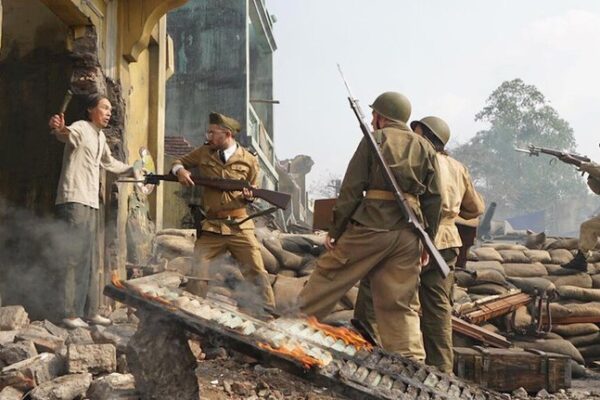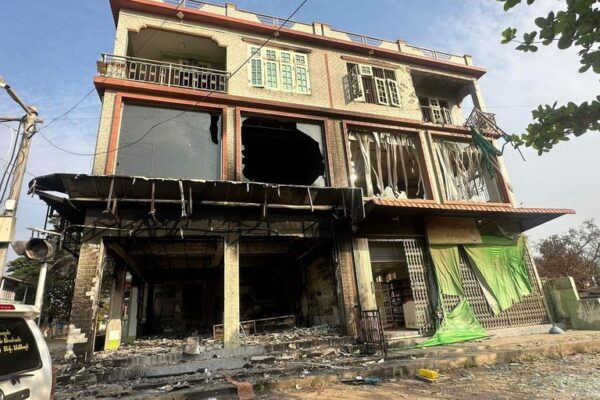The anti-junta Arakan Army seized an outpost manned by the military-affiliated Border Guard Force along western Myanmar’s border with Bangladesh on Sunday, confiscating arms and equipment, according to residents and an alliance of ethnic rebels. The attack marked the latest blow to Myanmar’s military in Rakhine state, where the ethnic Arakan Army, or AA, ended a ceasefire in November that had been in place since the junta assumed power in a Feb. 1, 2021, coup d’etat. The AA took control of the Taung Pyo Let Yar outpost in Maungdaw township on Sunday afternoon, taking prisoners and prompting nearly 60 fighters with the Border Guard Force, or BGF, to flee towards the border, the Three Brotherhood Alliance – of which the AA is a member – said in a statement. The statement by the alliance, which also includes the Ta’ang National Liberation Army, and the Myanmar National Democratic Alliance Army, said that AA fighters were killed in the battle, although it did not provide details of the number of casualties. It said the AA is also attacking a nearby BGF outpost called Taung Pyo Let Wae. The two outposts, located just north of the seat of Maungdaw township, are vital to the junta and each were manned by at least 100 soldiers, residents told RFA Burmese. Local people bring a man wounded by a gunshot to Médecins Sans Frontières (Doctors Without Borders) in Ukhia, Bangladesh, Feb. 4, 2024. (Tanbir Miraj/AFP) Photos and videos of the battle posted to social media appeared to show BGF troops running towards the Bangladesh border amid volleys of gunfire, as well as wounded BGF fighters. Media reports cited officials in Bangladesh as saying that at least 95 Myanmar border guards, some of whom are wounded, have fled across the border over the last few days. Reports said the Myanmar border guards had been provided shelter at Bangladesh Border Guard outposts and that at least 24 of them had been sent to hospitals in neighboring Cox’s Bazar district to be treated for their wounds. Fierce fighting continued in the area on Monday, residents said, and the military sent a jet fighter to carry out an airstrike. One resident of Maungdaw who declined to be named due to security concerns said the AA began attacking the outposts on Saturday, forcing villagers to flee to the border for safety. “Some local residents fled to Bangladesh, while others dug bunkers and took shelter,” he said. “Fighting is ongoing … so [people] don’t dare stay there. A plane came and attacked two or three times.” More than 1,000 people live in the Taung Pyo area, including residents of nearby Thin Baw Hla and Mee Taik villages who were displaced by fighting between the military and anti-junta forces in 2022. The junta has not released any information about the attacks on the BGF outposts in Maungdaw or troops fleeing to Bangladesh. Calls by RFA to Hla Thein, the junta’s attorney general for Rakhine state, went unanswered Monday. Fighting spills across border At least two people in Bangladesh – a Bangladeshi woman and a Rohingya refugee – were killed on Monday when a mortar shell fired from Rakhine exploded on the woman’s house in Bandarban district near where the fighting was happening, media reports said, citing Bangladeshi government officials. Police identified the two victims who died in the mortar explosion as Hosne Ara, 50, a local resident, and Nobi Hossain, 65, a Rohingya laborer who was working at her house. “Firing and shelling had intensified since the morning. Suddenly, a mortar shell landed in my sister’s house and exploded. She died,” Shah Alam, Hosne Ara’s brother, told BenarNews, an RFA-affiliated news outlet, on Monday. A Bangladeshi boy displays a bullet, allegedly shot from Myanmar during fighting between Myanmar security forces and Arakan Army, in Ghumdhum, Bangladesh, on Feb. 5, 2024. (Shafiqur Rahman/AP) Iman Hossain, the son of the dead Rohingya laborer, said his family had received the news that his father was killed in the explosion. “We came to Bangladesh from Myanmar to save our lives. But my father died in a Myanmar mortar shell [explosion]. What else can be more painful than this?” Nobi Hossain told BenarNews. Some 1 million ethnic Rohingya refugees have been living in Bangladesh since 2017, when they were driven out of Myanmar by a military clearance operation. ‘AA will press further’ Another resident of Rakhine’s Maungdaw township, who also spoke on condition of anonymity citing fear of reprisal, said only 10 BGF battalions and three BGF tactical forces remain there and in nearby Buthidaung township. “I believe the AA will press further,” he said. “If the outposts of Taung Pyo are captured, I think that [cross-border] trade will resume in Rakhine state. Also, I think, the rest of the outposts in the area will be attacked, too.” The resident said the AA is likely targeting outposts along the border to reestablish trade routes with Bangladesh, which had been blocked by the military. “When the junta blocked the roads to Rakhine, all goods became scarce, so the AA feels they have the responsibility to reopen them,” he said. “Therefore, it can be assumed that the main reason for the attacks in Maungdaw are to reestablish trade with Bangladesh.” Smoke rises from a Myanmar Border Police post following fighting with Arakan Army forces near Ghumdhum, Bangladesh, Feb. 5, 2024. (Shafiqur Rahman/AP) The AA announced in December that it had captured more than 60 BGF outposts since November, when fighting resumed in Maungdaw township. The group claimed that junta troops retreated from most of the outposts because they were “afraid of being attacked.” The AA has launched offensives against junta bases in Buthidaung, Maungdaw, Mrauk-U, Minbya, Kyauktaw, Rathedaung, Ponnagyun and Ramree townships. Rohingya refugees Meanwhile, in Rakhine’s Taung Nyo township, where clashes between the military and the AA are now raging, the junta has set up temporary camps to receive some of the Rohingya refugees who have been living in Bangladesh. Khin Maung, an aid worker who is assisting…






